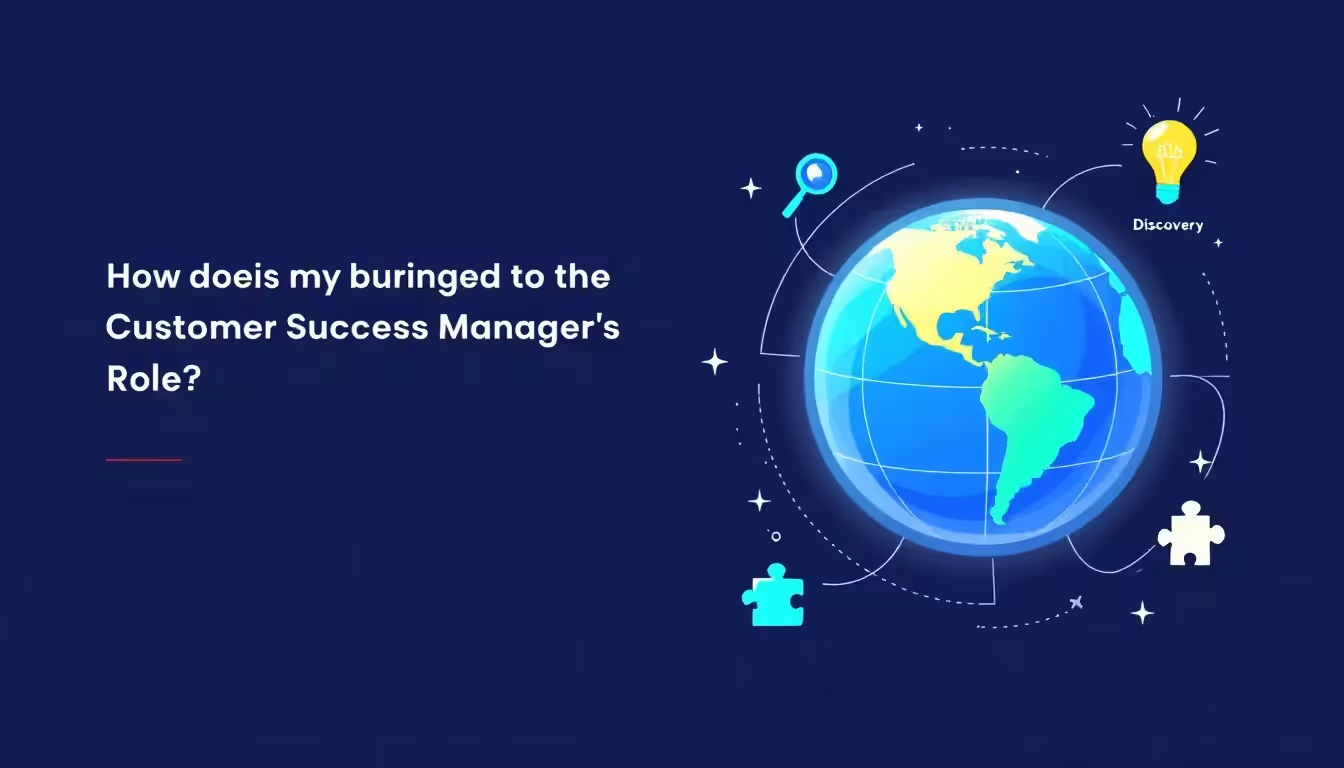Customer success managers (CSMs) are essential in helping clients achieve their goals and get the most out of a product or service. They build long-term relationships, enhance customer satisfaction, and reduce churn. In this article, we will break down the key responsibilities, necessary skills, and the tools CSMs use to succeed.
Key Takeaways
- Customer Success Managers (CSMs) focus on proactive engagement, guiding customers to maximize product value and reduce churn while aligning sales and support teams for seamless experiences.
- Key responsibilities of CSMs include onboarding new customers, monitoring health scores to identify potential issues, and facilitating product adoption to enhance customer satisfaction and loyalty.
- Hiring CSMs from Latin America offers significant cost savings and access to skilled professionals, while companies must invest in continuous development and leverage data analytics to maintain competitiveness.
Understanding the Role of a Customer Success Manager

Customer Success Managers are primarily responsible for helping customers achieve their goals and ensuring they derive maximum value from the products or services they use. Unlike traditional customer service, which is often reactive, the customer success function is proactive, focusing on long-term relationship building and continuous engagement. This approach not only enhances customer satisfaction but also drives recurring revenue and reduces customer churn.
The customer success role involves aligning sales and support teams to create seamless customer experiences throughout the product lifecycle. Proactively identifying opportunities for customer success allows customer success associate CSMs to significantly contribute to the company’s growth and overall success. Additionally, there are various customer success jobs available that cater to different skill sets. A customer success specialist can play a vital role in this process.
The investment in customer success is proving beneficial, with 92% of companies maintaining or increasing their investment in this area.
Key Responsibilities of Customer Success Managers

A customer success manager wears many hats, each crucial for ensuring customer satisfaction and retention. One of their primary roles is to guide new customers through the initial stages, ensuring they understand and effectively use the product. This proactive engagement helps in setting the foundation for a successful customer journey.
Beyond onboarding, CSMs are responsible for monitoring customer health scores to preemptively identify potential issues and address them before they lead to churn. They also implement strategies to encourage customers to fully adopt and utilize all available features of the product.
Understanding these responsibilities highlights their significance in the customer success function.
Onboarding New Customers
The onboarding process is a critical phase in the customer journey, and CSMs play a vital role in ensuring new customers start on the right foot. From potential buyers to active users, CSMs guide clients through tailored training sessions and personalized interactions. This ensures that new customers understand how to use the product effectively from the start, setting them up for long-term success.
Developing strong customer relationships requires ongoing engagement and personalized interactions. Tailored training sessions help new customers understand product functionalities and maximize value from day one. This proactive approach not only enhances the customer’s experience but also fosters customer loyalty and retention.
Monitoring Customer Health Scores
Monitoring customer health scores is essential for identifying potential issues that may lead to churn. Tracking these scores allows CSMs to manage customer accounts proactively and address concerns before they escalate. Research indicates that 67% of customer churn is preventable when effective health score monitoring and engagement practices are implemented.
Customer success managers utilize dashboards to visualize customer engagement and health metrics, allowing for better analysis and decision-making. Effective customer success software enables CSMs to automate tasks and gain insights into customer behavior, aiding in tracking health scores and ensuring customers achieve their desired outcomes.
Facilitating Product Adoption
Facilitating product adoption is another key responsibility of CSMs. Targeted engagement strategies encourage customers to fully utilize the product’s features. Regular check-ins with customers ensure continuous product engagement and help identify any issues that may hinder their experience.
These proactive efforts not only enhance customer satisfaction but also promote customer loyalty and retention. By ensuring customers are effectively using the products and deriving value, CSMs help in achieving long-term success for both the customers and the company.
Essential Skills for Customer Success Managers
Customer Success Managers need a diverse skill set across multiple competencies to excel in their roles. Key skills include strong communication, problem-solving abilities, and empathy, all of which contribute to building and maintaining successful customer relationships. Continuous learning is also important for CSMs to adapt to rapid changes in the field.
Companies value prior industry knowledge alongside customer success skills in candidates for CSM roles. Good product knowledge, motivation, and drive are personal qualities that are crucial for success in customer success positions.
The following section explores these essential skills in detail.
Communication Skills
Customer success professionals must have excellent interpersonal skills to engage effectively with both customers and their internal teams. Communication is vital for establishing trust and credibility, and it involves articulating complex ideas, active listening, clear writing, and delivering persuasive presentations.
Flawless communication with customers and open communication internally are essential for successful customer engagement. Consistent and reliable interactions foster long-term loyalty, build credibility, and deepen customer relationships.
Problem-Solving Abilities
Customer success managers act as primary problem-solvers, anticipating issues and developing effective solutions. Essential skills for addressing customer issues include identifying problems, analyzing root causes, and developing new solutions.
Quickly and efficiently solving problems enhances the customer experience and builds trust. The ability to adapt and manage change is also a key quality for success in customer success roles.
Empathy in Customer Relationships
Empathy is essential for understanding customers’ emotions and building stronger relationships. Recognizing and responding to customer emotions leads to more fulfilling interactions. This helps in connecting with clients on an emotional level, fostering trust and rapport.
Empathy enables customer success managers to understand and meet customer needs more effectively, contributing to long-term customer loyalty and retention. Stronger relationships lead to higher customer satisfaction and overall success for both the customers and the company.
Tools and Technologies for Customer Success Managers

Customer success managers utilize various tools to enhance client success and streamline their processes as a customer success analyst. These tools help track user data, gather input, and monitor customer impact and ROI. Additionally, the customer success team plays a crucial role in this customer success work.
The subsections will explore the specific tools and technologies used by CSMs.
Customer Success Software
Using technology in customer success management is crucial as it helps track user data, gather input, and monitor customer impact and ROI. Customer success software assists CSMs in monitoring various user activities by connecting with CRM and product systems, mapping trends, and reporting key statistics.
These tools enable CSMs to automate tasks and gain insights into customer behavior, which aids in tracking health scores and ensuring customers achieve their desired outcomes. SaaS companies particularly benefit from these technologies, as they help in making informed company decisions and improving customer satisfaction.
CRM Systems
CRM systems are crucial for maintaining comprehensive records of customer interactions, which helps tailor the customer experience. Effective use of CRM systems enhances the personalization of services offered to customers.
These systems allow CSMs to track interactions and preferences of clients, enabling better relationship management and improved customer loyalty. The integration of CRM systems with other departments, such as sales and marketing, further enhances the overall customer journey.
Measuring Success in Customer Success Management
Measuring success in Customer Success Management is crucial for understanding the effectiveness of strategies and initiatives aimed at customer satisfaction. Strong customer relationships lead to increased customer satisfaction and retention.
The upcoming subsections explore key performance indicators (KPIs) and customer feedback loops for measuring success.
Key Performance Indicators (KPIs)
Key Performance Indicators (KPIs) such as Net Promoter Score (NPS), Customer Satisfaction Score (CSAT), and Churn Rate are crucial for evaluating customer success and enhancing strategies. The NPS measures customer loyalty and satisfaction based on their likelihood of recommending a product or service.
The CSAT evaluates how satisfied customers are with a company’s products or services, often assessed through surveys. The Churn Rate indicates the percentage of clients who stop using a company’s service during a specific time period, reflecting the effectiveness of customer retention strategies.
Customer Feedback Loops
A customer feedback loop involves collecting, analyzing, applying feedback, and following up with customers to enhance products and services. A well-structured feedback loop can significantly enhance customer experience and brand perception.
Joint efforts between CSMs and marketing can lead to more effective customer feedback collection, improving overall service quality. This continuous improvement process helps in identifying customer needs and ensuring they are met effectively.
Why Hire Customer Success Managers in Latin America

Hiring customer success managers in Latin America can lead to operational cost savings of 30-70% compared to U.S. salaries. Candidates from Latin America often possess strong communication skills and problem-solving abilities, making them valuable for enhancing customer engagement.
The cultural similarities between Latin America and the U.S. can improve team retention and integration within companies. Additionally, nearshore hiring in Latin America allows companies to recruit talent that works in the same time zones as their U.S.-based operations.
Steps to Hire Customer Success Managers in Latin America

Hiring customer success managers in Latin America can save businesses 30-70% compared to U.S. salaries while maintaining high service quality. Companies can hire skilled customer success managers from Latin America in as little as 21 days through streamlined processes.
Pre-vetted candidates from Latin America often have strong English proficiency and possess relevant work experience. Nearshore hiring enables better collaboration, as candidates in Latin America work in similar time zones to U.S.-based teams.
Competitive Compensation and Benefits by Country
Argentina
In Argentina, the average salary for a Customer Success Manager ranges from $25,000 to $45,000 annually. Argentina is known for its strong educational system and a high level of English proficiency among professionals. This makes it an attractive destination for companies looking to hire skilled customer success professionals who can effectively engage with English-speaking clients.
Brazil
Brazil offers an average salary for Customer Success Managers between $30,000 and $55,000 per year. The country is a major economic hub in Latin America, providing a large pool of talent with expertise in various industries. Brazil’s diverse workforce and cultural affinity with Western countries make it a strategic choice for companies seeking customer success roles.
Chile
In Chile, Customer Success Managers typically earn between $28,000 and $50,000 annually. Chile is recognized for its stable economy and strong business environment, which fosters a professional workforce adept in customer success roles. The country’s focus on innovation and technology further enhances its appeal for businesses looking to expand their customer success teams.
Colombia
Colombia offers a salary range of $25,000 to $45,000 for Customer Success Managers. Known for its rapid economic growth and investment in education, Colombia provides a skilled workforce with strong communication and problem-solving abilities. The country’s strategic location and time zone compatibility with North America make it a favorable option for nearshore hiring.
Mexico
In Mexico, the average salary for Customer Success Managers is between $30,000 and $55,000 per year. Mexico’s proximity to the United States, coupled with its robust infrastructure and bilingual workforce, makes it an ideal location for companies to establish their customer success operations. The country’s diverse economy supports a wide range of industries, providing ample opportunities for customer success professionals.
Peru
Peru offers Customer Success Managers an average salary range of $27,000 to $48,000 annually. Peru’s growing economy and focus on developing its technology sector have resulted in a skilled workforce ready to meet the demands of customer success roles. The country’s emphasis on education and professional development further strengthens its position as a valuable source of talent.
Uruguay
In Uruguay, Customer Success Managers typically earn between $28,000 and $50,000 per year. Uruguay is known for its high quality of life and
Conclusion and Future Actions
The future of Customer Success is characterized by the need for continuous adaptation to technological advancements and evolving customer expectations. Investing in the continuous development of Customer Success teams is essential for enhancing skills and maintaining a competitive advantage.
Companies should focus on building long-term partnerships with clients and leveraging data analytics to personalize customer interactions and identify potential churn risks.
Summary
Customer Success Managers play a critical role in driving long-term business growth by ensuring customers achieve their desired outcomes. By leveraging essential skills, tools, and strategies, CSMs foster deep customer relationships, reduce churn, and enhance overall customer satisfaction. Investing in customer success is a strategic move that can transform your business and elevate the customer experience.
Frequently Asked Questions
What is the primary role of a Customer Success Manager?
The primary role of a Customer Success Manager is to ensure customers achieve their desired business outcomes by proactively engaging with them and maximizing the value they receive from the products or services. This focus on customer satisfaction is crucial for fostering long-term relationships and business success.
How do Customer Success Managers prevent customer churn?
Customer Success Managers effectively prevent churn by monitoring customer health scores to identify and address potential issues early, while also ensuring product adoption and continuous engagement. This proactive approach helps foster strong customer relationships and satisfaction.
What are some essential skills for a Customer Success Manager?
Strong communication, problem-solving abilities, and empathy are essential skills for a Customer Success Manager, as they facilitate the development and maintenance of successful customer relationships.
Why should companies consider hiring Customer Success Managers from Latin America?
Companies should prioritize hiring Customer Success Managers from Latin America for the notable cost savings, strong communication skills, cultural alignment with U.S. companies, and favorable time zone compatibility, which together enhance operational efficiency.
What tools do Customer Success Managers use to enhance customer experiences?
Customer Success Managers utilize customer success software and CRM systems to effectively track user data, gather feedback, and monitor customer interactions. These tools are essential for enhancing overall customer experiences.
